Pico Iyer on the meaning of home, in a post-Trump world
The well-travelled writer expounds on migration after Trump’s win, lauds Canada, and remembers his mentor Leonard Cohen
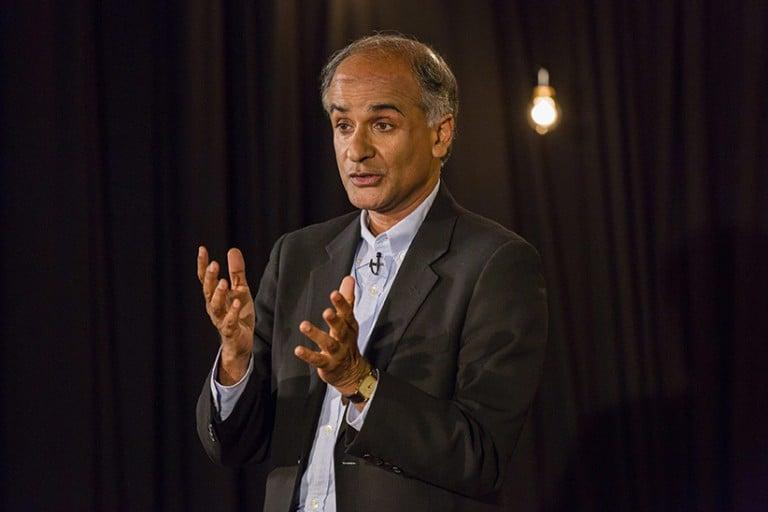
In this Aug. 6, 2014 photo provided by TED, Pico Iyer speaks at the TED@250, The Non-Fiction Edition, TED head quarters, in New York. Iyer has spent the past several decades on the move, incessantly hopping from one far-flung destination _ Ethiopia, Morocco, Indonesia _ to another. But the globetrotting travel writer is now convinced the most exciting place to go is nowhere at all. (Ryan Lash/TED/AP/CP)
Share
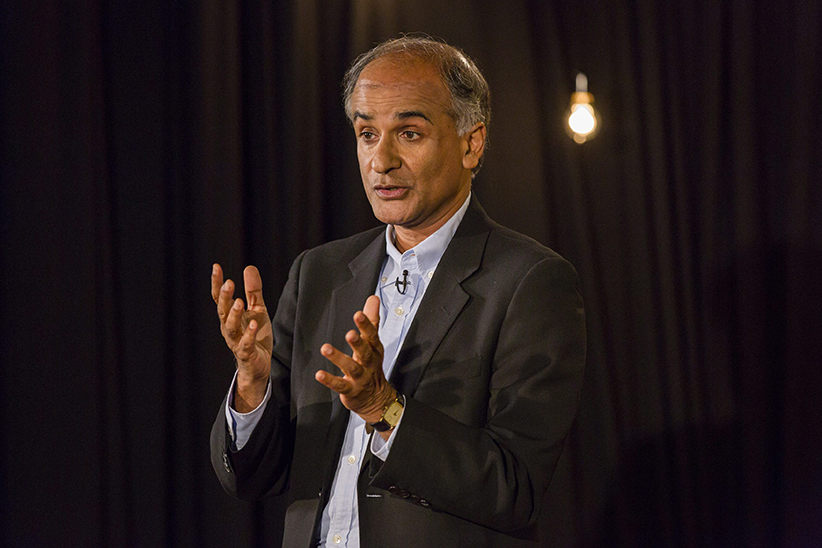
“As a guide to far-flung places, Pico Iyer can hardly be surpassed,” The New Yorker once said of the prolific travel writer and thinker who has delivered three eloquent TED Talks, as well as books like The Open Road and The Art of Stillness. But Iyer also delivers the goods on everyday experiences. The multicultural multinational who penned The Global Soul maintains a stirring belief in a transnational future, and interconnected possibilities; he still evokes the Zen calm he beautifully captured in The Lady and the Monk: Four Seasons In Kyoto.
From his home near Nara, in Japan, he spoke to Maclean’s about what home means, after Donald Trump’s election; the inspiration he takes from Canada; and his old friend and mentor Leonard Cohen.
Q: One of my abiding memories of New York City is the friendliness of head-scarfed Muslim-American women. How much damage will Donald Trump’s threats—like a ban on Muslims—do to the idea of America that has inspired travellers around the world?
A: It’s impossible to say! If the recent American election taught us anything, it was the folly of assuming we can predict the future! We really don’t know a thing.
I remember how, when President Obama came into office, riding a similar spirit of popular suspicion against established leaders, many of my friends thought he would change the world; that was a more than unrealistic expectation, especially given the nature of American politics today, and President Obama was wise enough to point that out from the outset.
Now those same friends are predicting apocalypse. But I’m guessing that Mr. Trump is not going to play according to our expectations, either, and nor is his government. Mr. Obama spoke for so many of the values I cherish—and the U.S. lost its finest travel writer when he went into the White House.
Mr. Trump doesn’t radiate many of the qualities I respect. But what do I know? I’ve never met Trump. I know he’s savvy enough to change his tune according to his audience and I don’t know very much at all about how government works.
As a member of the mainstream media for 34 years now, I’ve learned just one thing: never to trust anything I read in the mainstream media—not because of any agenda or deliberate dissimulation, but simply because it’s filtered and comes very often from someone whose judgment I might not trust in other circumstances. So these days I tend to trust only what I see and experience myself—one reason I try to travel to Iran and North Korea and Cuba, rather than just read about them.
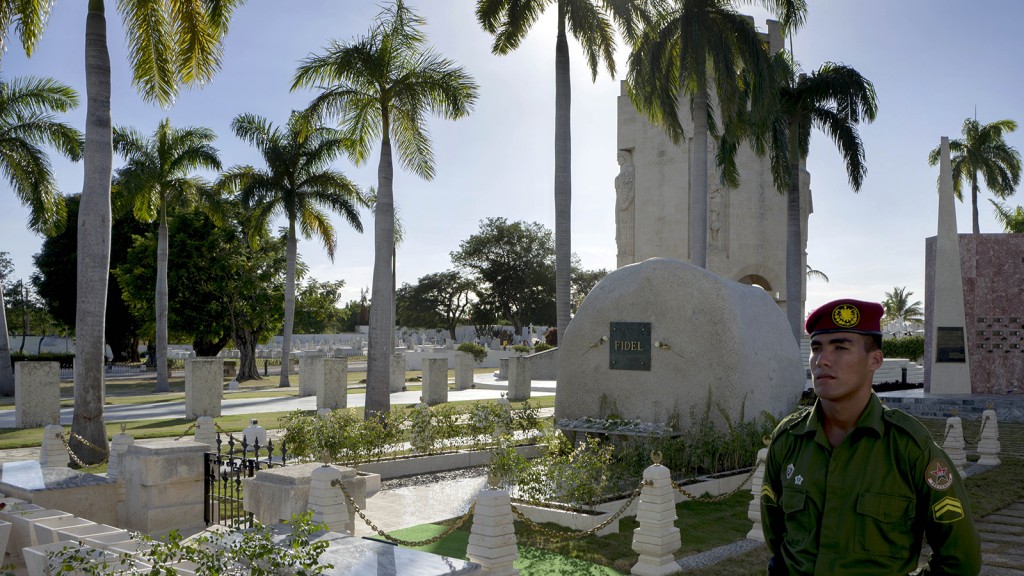
Q: Will Cuba, another of your most cherished places, become a better place post-Fidel?
A: It should become much better for the Cubans, I hope: freer, less encumbered by history, better able to move toward a constructive future.
Some foreigners, of course, are already decrying the fact that McDonald’s and Starbucks are on the way; we sometimes want places to look old-fashioned, quaint and out-of-it because it gives us a more exotic adventure and makes for more aromatic images on our smartphones. But I’m thrilled if my Cuban friends can finally get all those things, and much more, after 50 years of barely being able to scrounge together a bar of soap, some shampoo or a meal for the day.
If Canadians and Spaniards and Americans can live with such amenities—and with the freedom to see and taste other cultures—why should the Cubans not get the chance to do so, too?
Q: Most travellers are “rooted in the future,” you observe in your TED Talk, ‘Where Is Home?’ And yet Trumpism fools voters with an idealized vision of the past.
A: At the very end of the last century, I happened to write an essay for Time magazine and for the World Economic Forum about how the world had turned into a battle between the future and the past—between those aged cultures that saw a virtue only in what had been obtained since the Middle Ages, and between young, fresh America with its confidence in the future.
I was writing then about Islamic fundamentalism, but of course the principle applies to every other kind of fundamentalism as well. And the more internationalism there is in the world, the more nationalism there will always be, as people feel scared of the Other streaming into their neighbourhood and don’t always know where to lay their foundations in a world on the move.
I was just traveling across Japan for a week with the Dalai Lama, as I do every November, and he said, wisely, and as one who has been following world affairs closely and leading his people for 76 years now: “Rulers come and go. It’s the people who are the real rulers of the country.”
Q: Perhaps that’s why you’ve been such an admirer of Canada for so long, since before your paean in The Global Soul?
A: One thing that has long hit me about Canada, ever since I started making annual visits there in 1994, is that people in the cities there are constantly—some would say obsessively—talking and thinking, every day, about diversity and refugees and the future and how to turn a culture made of many disparate parts into something greater than their sum.
The other countries I know—from Britain to the U.S.—have all backed into multiculturalism; it’s taken them by surprise and they’ve tried to adapt or stretch their current society into something that will accommodate new visitors. Only in Canada has there been a strong sense of vision about creating an entirely new kind of society to match the age of movement. And Canada has been addressing that issue for half a century—ever since Pierre Trudeau hung a sign that said “World Citizen” outside his door at Harvard and began travelling the world.
Of course, those who live in Canada are keenly aware of everything that’s going wrong and moments when optimism has been unfounded. But my impression is that the more people travel—whether it’s Salman Rushdie or the spokesperson for the UN High Commission on Refugees—the more they admire Canada, and see something coming to light there that we don’t find so often in Australia or South Africa, in Singapore or Hong Kong.
Whenever my friends there say that their country is no utopia, I agree—but ask them if they really want to move to Dubai or L.A.
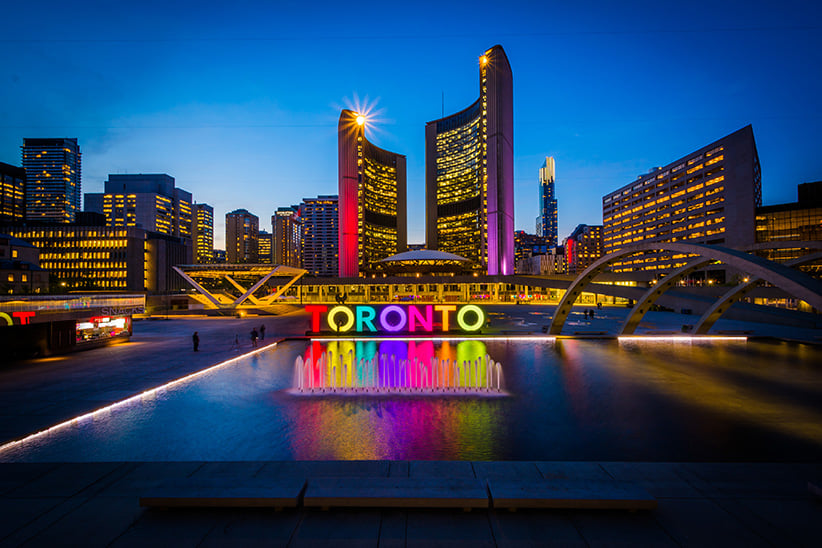
Q: You love the inclusive, cosmopolitan vibrancy of Toronto, and you wrote that in Toronto, “the average resident today is what used to be called a foreigner, somebody born in a very different country.” In late 2016, it’s top of mind for many: what does finding home mean in a less immigrant-friendly world?
A: From the beginning, I’ve stressed that home is something internal, invisible, portable, especially for those of us with roots in many physical places; we have to root ourselves in our passions, our values and our deepest friends. My home, I’ve always felt, lies in the songs and novels that I love, in the wife and mother that I’m never far away from, in the monastery to which I’ve been returning for 25 years. Precisely because I don’t belong entirely to Britain or the U.S. or India or Japan, I build my foundations in some way deeper than mere passports, and more in the light of where I’m going than of “where I come from.”
Of course, the Brexit vote, the victory of Mr. Trump, what’s happening around the world represents a backlash against precisely people such as myself, blessed with many homes. But I don’t think that changes the fact—the inarguable reality—that for many in Toronto, say, “home” means a question they’ll always be refining and adding to (and may never answer), while home also means a place like Toronto, where they’re surrounded by people entertaining just the same questions.
We may be joined these days more by the questions we have in common than by the answers we share.
Some people will always ground themselves very strongly in a piece of soil, a grandmother’s property, a tiny plot of land, and that’s great. But in the Age of Movement, there’s no question that the number of people who don’t—or can’t—is growing exponentially.
Q: ‘The Beauty of What We’ll Never Know’ is the latest in your popular series of Ted Talks. What might you hope people take away from it?
A: A sense of humility, perhaps.
TED Talks, as you know, are usually about wonderful discoveries, new inventions, all the ways we’re pushing the frontiers of knowledge forward. But when the organizers of the first TED Summit ever held invited me to deliver the final talk, this past summer in Banff, I thought maybe the best thing I could offer was a mischievous coda: Yes, we know more than ever before, and it’s a wonder that we get to inhabit a world full of driverless cars and 3D printers. But that doesn’t mean that we know any more about the essential things in life—love, faith, death—and it would be dangerous to assume we did. The only thing that gets us through sometimes is a proper, humbled sense that we don’t have a clue, we can’t be sure what’s going to happen next and life will always be much larger than our ideas of it.
In terms of technology and science, tomorrow does know more than yesterday; but when it comes to emotions, living with uncertainty, terror, I’m not sure we know any more than Shakespeare did, or the Buddha. And the power of new things—the iPhone or Facebook—is so strong and intoxicating that we sometimes forget that none of them can fundamentally change our relation to ourselves and to what matters.
So in the process of savouring, rightly, all the great new things that excite and tickle us, I really hope we don’t lose sight of what makes us truly happy, deep down.
Q: “Sometimes making a living and making a life point in opposite directions,” as you put it in The Art of Stillness.
A: It’s our passions, our loved ones, the times life takes us by surprise.
There’s so much visible stuff around now, we’re tempted to forget that it’s usually the invisible that matters most.
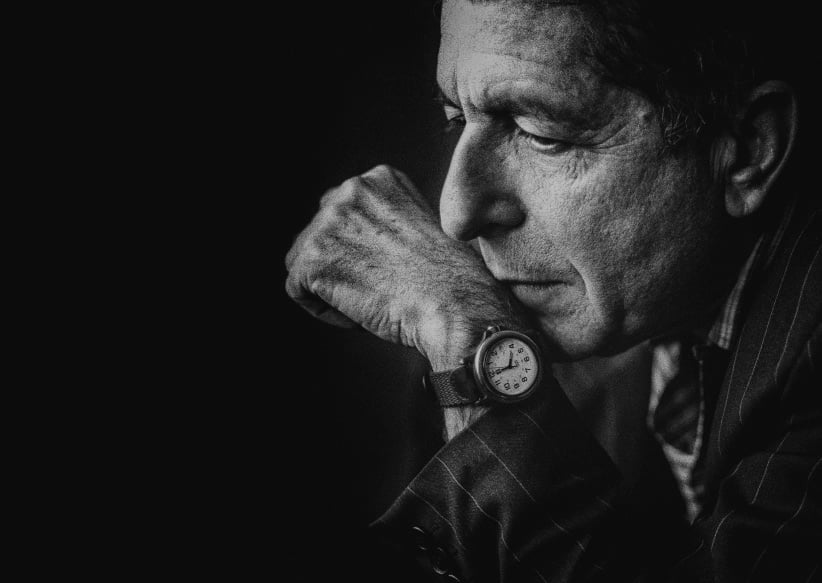
Q: Your Graham Greene counter-biography The Man Within My Head begins with a epigram: “What means the fact which is so common, so universal that some soul that has lost all hope for itself, can inspire in another listening soul infinite confidence in it even while it’s expressing its despair.” Leonard Cohen has done that for me for years: his earned, cathartic darkness. Today, his elegiac songs speak profoundly to our uncertain moment.
A: Absolutely. So many of my friends noticed that it seemed almost painfully apt that North America’s great voice of irony, of courtesy, of subtlety and of wisdom departed the scene hours before the recent American election. The world was left scrambling to find some way to make sense of all the shocks. Leonard puts everything in a higher, clearer perspective, seeing both light and dark as from the top of a mountain, with a much larger sense of horizon. He saw and sees things in a wider frame of time and space, and always reminds us to look beyond left and right, toward whatever is ultimate.
Q: How did Cohen embody Canada’s best qualities, the homely qualities that make it one of your favourite countries?
A: Somehow Leonard could only have come from Canada, I feel, and it’s no surprise that he held it so firmly in his heart till his dying day.
One of his sovereign graces was always to mix a sense of irony with a sense of passionate quest, to sound as if he never took himself too seriously, yet took many other things (and other people) very seriously indeed. That mix of an Old World sense of drollness and respect for tradition with a New World hunger for something better and fascination with the horizon is, to me, the illuminating beauty of Canada: it never pursues the future as if it can deny every kind of past.
Leonard was really Montreal incarnate, in so many ways, as one who mixed the worldliness and elegance of France with the hopefulness and sincerity of North America.
Q: “I had never met a writer who used words so well. I had certainly never met someone who used silence with such power,” you write. How has Cohen changed you as a writer and person?
A: Leonard taught me about kindness, about graciousness, about humility. He was always waiting at his door when I visited him, as if I were the important person, not he, and then he’d start scrambling me eggs or heating up some bagels from Montreal, as if his only purpose in life was to serve. From the first moment I saw him in his monastery, shovelling snow, tending ceaselessly to his very aged Japanese teacher and washing dishes for the community, I realized that even this famous being whom so much of the world adored was strong enough to look beyond both fame and adoration and turn himself into an anonymous grunt of sorts, tending to everyone he met.
As a writer he taught me that every word must count, and should turn in many directions, work on several levels, all at once. As someone said of Samuel Beckett, Leonard reached to the rocks below the river and polished them till they shone.
He taught me to write slowly, to cut beneath the chatter and to try to talk intimately about what really matters. Indeed he was very similar to Graham Greene in his restlessness, his commitment to kindness and honesty, and his refusal to settle into any group or category while refusing to settle for the easy dead-end of disbelief.
Leonard was more eloquent than anyone I ever met, and yet he knew the value of silence. He could be funnier, more surprising, more exalted in speech than any writer you would run into, but at heart you felt he wasn’t a person of chit-chat or small talk. I learned more than I can say when he’d lead us both out into his tiny garden and just sit there, in silence, often for half an hour or more.
I’ve spent much of my life in monasteries and I’d say that I never met a more serious, determined or disciplined monk than Leonard.
Alexander Bisley writes about arts and travel. Follow him on Twitter here.